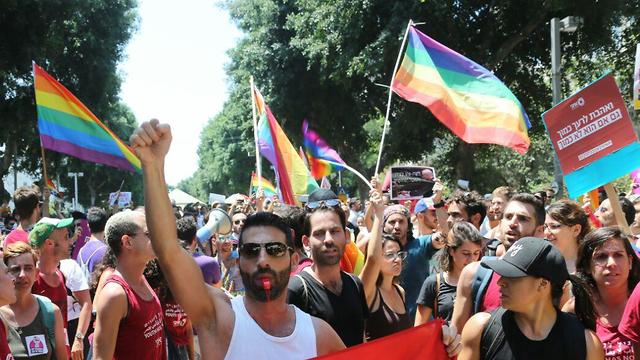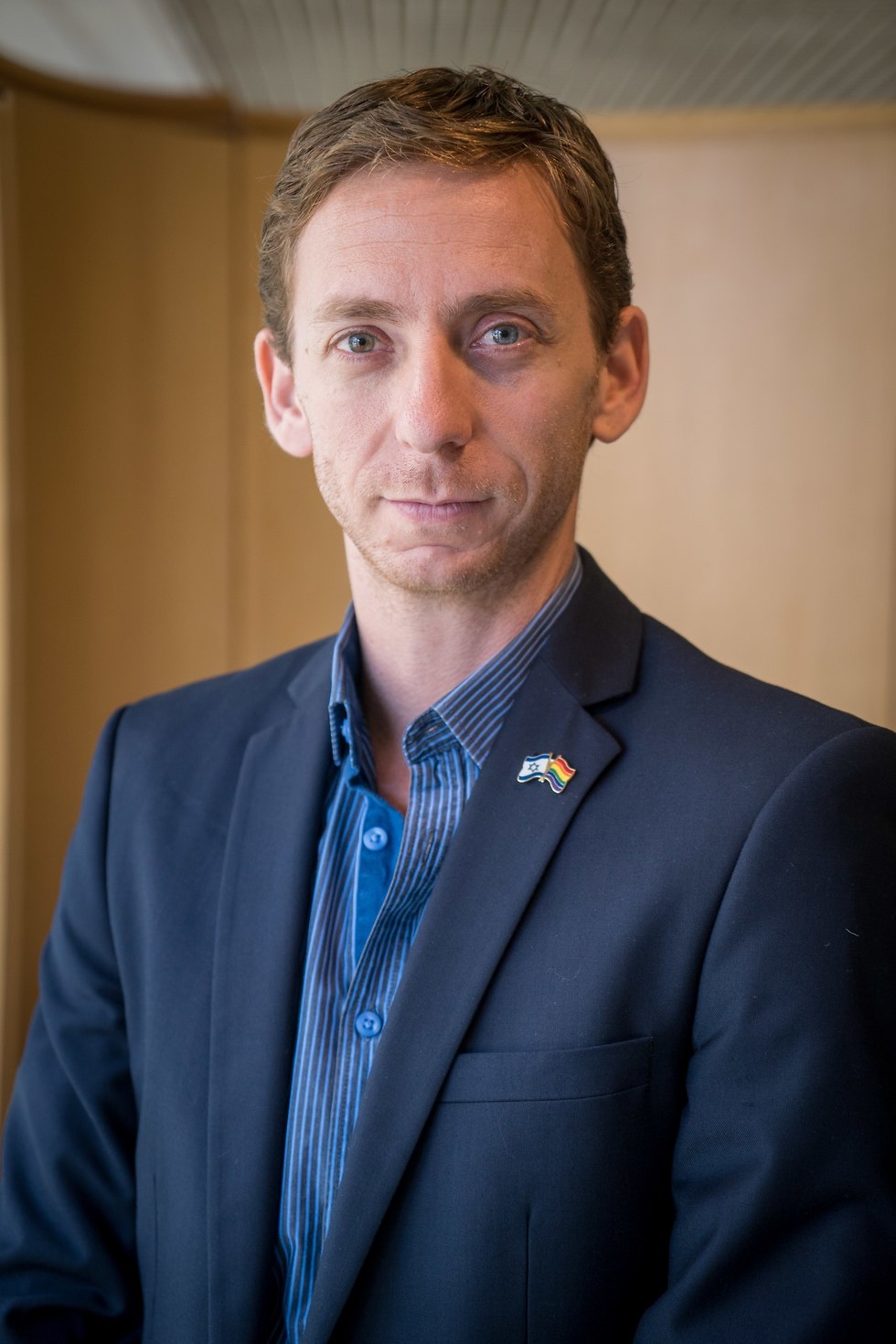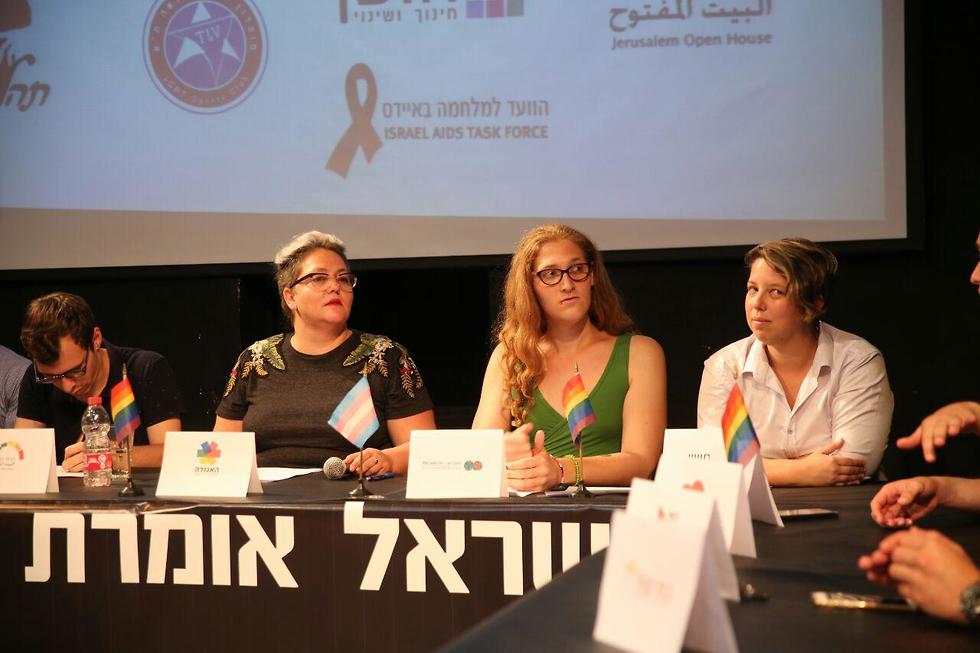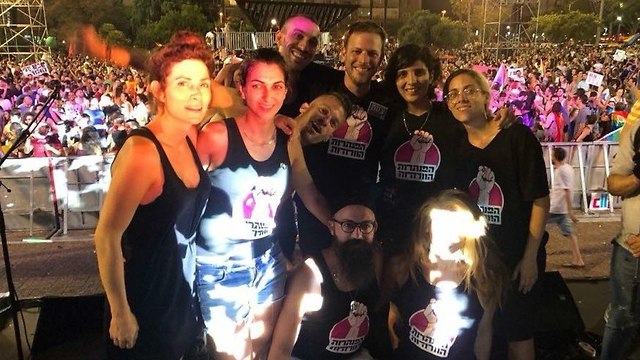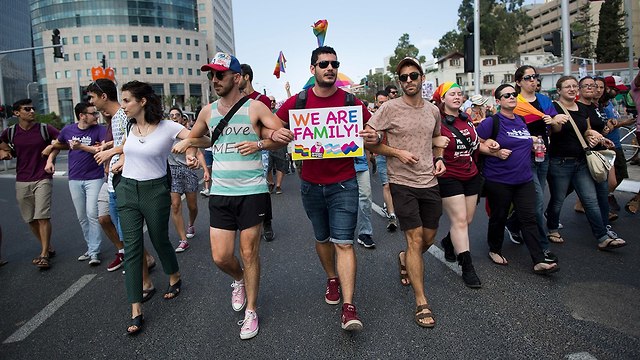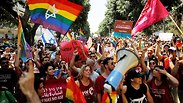
LGBT community revives protests
Although LGBT demonstrations—sparked last July following the passing of the discriminating Surrogacy Law—seemed to have subsided, the campaign's organizers insist they are working tirelessly behind the scenes to breathe new life into the struggle, which they say is essential not only for the community but for Israel as a whole.
On that day, hundreds of thousands of people demonstrated against the inequality, discrimination and the insecurity felt by the members of the LGBT community. The demands were not particularly complicated, and what began as a protest against the deliberate exclusion of homosexual couples from the Surrogacy Law became part of a broader protest that tried to provide a platform for the various struggles the Israeli LGBT community has to face.
Last week, a special discussion was held in the Knesset about the issue, after 40 MKs signed a petition for Prime Minister Benjamin Netanyahu to attend and address the matter. Earlier, the opposition submitted five bill proposals that are meant to amend Israel's law books in line with the demands of various LGBT organizations.
A few days after the historic July protest, it seemed as though the momentum had somewhat faded—the Knesset went on hiatus, the media moved on to other pressing issues, and it appeared the energy invested in bringing out tens of thousands onto the streets has run out.
Oded Fried is one of the people working behind the scenes to further advance the protest. Fried served as a parliamentary advisor and a former executive of the Aguda—Israel's LGBT Task Force, and was recently appointed as the LGBT community’s representative in the Knesset—a position that was created following years of the Knesset’s communications with the community done through leaders of many different organizations and in a very sporadic manner.
“The main goal is to change the equation," said Fried. “To say, 'We’ve had it up to here! You won’t keep disrespecting us, and we won’t continue to play the game—getting up every morning, going to work, paying taxes, and just accepting things as they are … We are taking the reins into our hands,'" stressed Fried.
Some work is already taking place behind the scenes. "We are present at (Knesset) committees' discussions and are in contact with directors-generals of various government ministries," he explained, "Even MKs from parties that strongly oppose LGBT rights are working with us and are cooperating with the community. We don’t always agree, but we're in the game."
One of the most prominent things in the current protest is the voice of the transgender community in Israel—which doesn’t receive much support from Israeli public or from the gay community itself, and is not heard during most discussions.
"The rally at Rabin Square was very important, but it was about the LGBT community in general, and the trans community was sidelined because a transsexual woman getting stabbed is a lot less sexy than the Surrogacy Law," elaborated Ella Amst, a transgender woman who serves as a spokesperson for an organization that fights for transgender rights in Israel.
“We realized that if we don't organize a major event, we would down in the noise. In the end … we organized the biggest transgender event in Israel … which was attended by around 7,000 men and women," Amst added.
Amst elaborated on the importance of allowing the transgender voice to be heard. "The community is coping with post-trauma. Even walking on the street as a transgender can be dangerous … Many people in the gay community are struggling to save their lives—40 percent of those in the trans community describe themselves as ‘suicidal,’ and 30 percent have been unemployed or homeless at some point in their life. This is a very difficult reality to navigate,” the activist opined.
One of the groups that emerged as part of this struggle is the Pink Panthers organization—an independent initiative of LGBT activists—who began organizing small-scale activities through Whatsapp rather than through community organizations. They are the driving force behind many of the recent LGBT protests.
Roee Neuman, who was at the core of the 2011 social justice protests, is now one of the leading figures in the Pink Panther organization.
"We hear about more and more countries that are working to end the discrimination against the LGBT community, while in Israel, in contrast to public opinion, there is no progress. The fact that for the first time in decades the government passed a law that blatantly discriminates against the community is what caused the latest outbreak of protests," vented Noiman.
Reut Nagar is also one of the founders of the group, and even won a place on the Meretz list for the Tel Aviv-Jaffa city council.
"Initially, I joined for the first protest to block King George street, and it was the first time I allowed myself to really get angry and realize we have nothing to apologize for," she described.
Oded Fried believes that one of the things the LGBT protest has contributed to is last week’s municipal elections. For the first time, LGBT candidates became prominent in various cities throughout the country, and the Aguda even went as far as to release its "Pride Platform," which includes a commitment to work for the community in the city where an LGBT candidate is listed.
“It does not start with the Surrogacy Law and does not end with a strike. For the first time, municipal elections candidates are committed to the Pride Platform," Fried emphasized.
In spite of everything, even those who are active in the various LGBT organizations think the Knesset’s hiatus put the community into a coma.
"We have been working for years to change the policy," said Amst, adding that the activists are now “in contact with the HMOs to make their services accessible to the transgender community, and Clalit has also agreed to help in the private case of a woman who could not receive hormone therapy she needed due to the policies implemented by her HMO."
“The dialogue with the police and Israel Prison Service (IPS) is also advancing, although slowly and cautiously," Amst added.
Fried underlined that the Knesset’s hiatus did not halt behind the scenes work of the community.
"We’ve created a work plan for the gay community in Israel—what we want to promote, where we want to be two or three years from now, and what our strategic goals are.
"One of the decisions we made was to develop cooperation not only with the political echelon but also with professionals such as directors-generals of ministries and heads of departments—those who can significantly influence decisions that reshape reality," Fried went on to say.
He expressed concern over the Knesset’s recent deliberations on whether to close the suicide prevention program. "When you choose to shut down this type of program, you have to remember that those who will be harmed are those in the LGBT community, especially the youth, since the rate of suicides in the community is above average. The Ministry of Health’s director-general, who attended our meeting, later promised the program will not be closed. Although it is a minor decision—it’s life changing,” Fried explained.
Tomo Chen, part of the Pink Panthers' core activists, is a bit less optimistic, noting that Israeli society, although tolerant toward the LGBT community in general, is still not as accepting when it comes to transsexuality.
“As far as laws and budgets are concerned, we did not progress even an inch,” Chen complained.
Noa Golani, Pink Panther and former chairwoman of the Labor Party's LGBT group, also feels the community is stuck in place.
"We have reached a peak, and now we need to move forward. The Knesset was on hiatus, which made it convenient for the government to evade us … but there are plans and ideas. I can not elaborate further, but the Knesset is back, we’re back protesting and it’s not going to stop here,” she stressed.
The activists had final words of encouragement for those LGBT members who do not feel part of the struggle, or those who are not part of the community but still wish to lend a helping hand.
“Wake up and take control of your life. Even when you think that everything is fine, know that it is not the case,” urged Fried.
“When the rest of the world realized the struggle is not just about the LGBT but about the way people wanted to see our society, it allowed the issue of gay marriage to become something that everyone wanted—recognition and inclusion … Join this struggle,” he added.
Amst went on to once again underline the subject of transexuality, saying having transgender people in your life is a privilege.
“Because of what we're going through, we have amazing perspectives on society, and we're really cool people in general … To be trans or queer is to understand that you do not have to be put in a box,” she concluded.
Tomo Chen also encouraged “our heterosexual and heteronormative brothers and sisters” to assist and not allow the momentum of the struggle to be lost, while Noa Golani said the struggle represents the fight “for not only our future but for the future of our country.”










